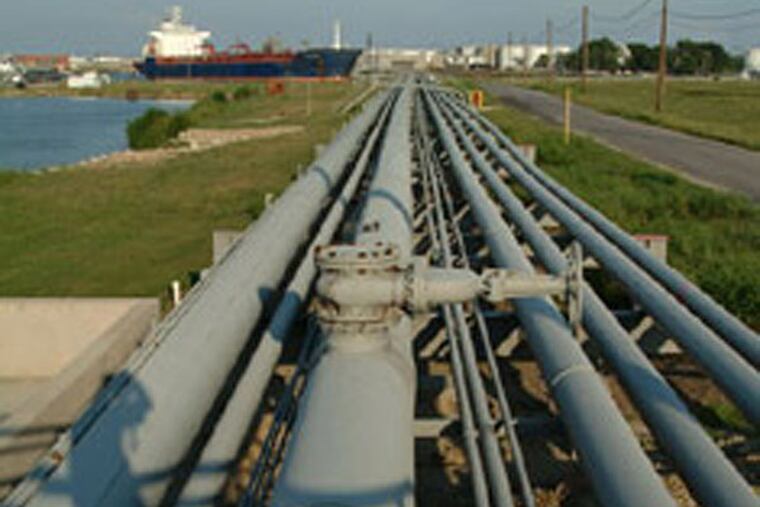Business, political leaders press for natural-gas infrastructure development
Business and political leaders on Thursday stepped up a campaign for developing massive new infrastructure to deliver energy to Philadelphia from the booming Marcellus Shale natural-gas fields.

Business and political leaders on Thursday stepped up a campaign for developing massive new infrastructure to deliver energy to Philadelphia from the booming Marcellus Shale natural-gas fields.
"We're really bound and determined to make an eastern natural-gas energy hub here in Philadelphia, and that's all about connecting to the Marcellus," Philip Rinaldi, chief executive officer of Philadelphia Energy Solutions, told the Greater Philadelphia Chamber of Commerce's State of the Region event at the Crystal Tea Room in Center City.
New pipelines to the city will help fuel new energy-intensive businesses, said Rinaldi, whose company operates the former Sunoco refinery in South Philadelphia. He is also chairman of the chamber's Energy Action Team, whose aim is to build support for the energy-hub concept.
A theme at Thursday's event was that the time is ripe for the region to tap into the Marcellus Shale, whose production is primarily shipped elsewhere because of the existing pipeline configuration.
"Where there is inexpensive fuel, and access to the fuel, there will be manufacturing and other users coming closer," said keynote speaker Daniel A. D'Aniello, chairman and cofounder of the Carlyle Group, the Washington private-equity giant behind the Philadelphia refinery rescue.
D'Aniello said political support from Gov. Corbett, Mayor Nutter and other elected officials was critical to building the infrastructure, as well as "a business community that is accepting of the sort of regeneration of what Philadelphia used to be."
U.S. Rep. Patrick Meehan (R., Pa.) said Pennsylvania was competing with Texas and Canada for shale-gas energy flows.
"The fact of the matter is the gas is going to go somewhere," said Meehan. "The question is, will it come through our region, and will we be able to take advantage of it to create new opportunities?"
The challenges of shipping shale-gas production by pipelines through populated suburban areas did not go unnoted.
Rinaldi said pipeline permitting threatens to become "Balkanized," and he criticized a Pennsylvania Supreme Court decision in December that overruled a state law that superseded local zoning laws on gas drilling. Business interests are concerned the court ruling will be applied to all manner of permitting.
Rinaldi cited the problems Sunoco Logistics Partners L.P. has encountered recently getting local approvals for its Mariner East project, which involves converting an existing eight-inch pipeline to move natural-gas liquids to Marcus Hook.
"Our colleagues at Sunoco Logistics are feeling the sting of this right now," he said.
A member of the audience wondered why allowing local control was a problem.
"There's nothing wrong with having communities have a say-so," Rinaldi responded. "But I think there are mechanisms about efficiencies, and in communities there's a political structure that allows it to kind of feed back and feed up to the state and to have those voices heard, but heard in a way that becomes kind of coordinated."
Energy experts said the need for new pipeline capacity to Philadelphia was underscored during the harsh winter, when existing pipeline capacity was strained, gas prices spiked, and so did the price of electricity generated by natural gas.
Rinaldi suggested that a pipeline be built with enough excess capacity to attract future industries looking to relocate to the region, including European manufacturers unsettled by high energy prices and uncertain Russian supplies.
New potential buyers of natural gas may include manufacturers that can convert gas into liquid motor fuels, said Jim Balaschak, an energy expert with Deloitte Consulting L.L.P.
Residential and small commercial customers of the city-owned gas utility, Philadelphia Gas Works, also may benefit from the lower cost of Marcellus gas compared to fuel now shipped into the region from Gulf Coast producers.
The president of UIL Holdings Corp., the Connecticut company that has agreed to buy PGW from the city for $1.86 billion, told analysts on Thursday in a conference call that his company would consider investing in a new pipeline if the PGW acquisition was approved by City Council.
"It's really an opportunity to lower the cost of gas to the consumer in Philadelphia by using gas from Pennsylvania," said James P. Torgerson, UIL chief executive.